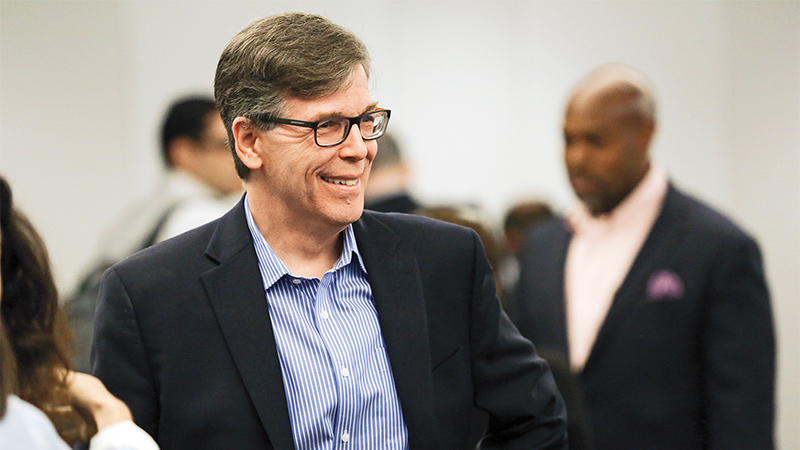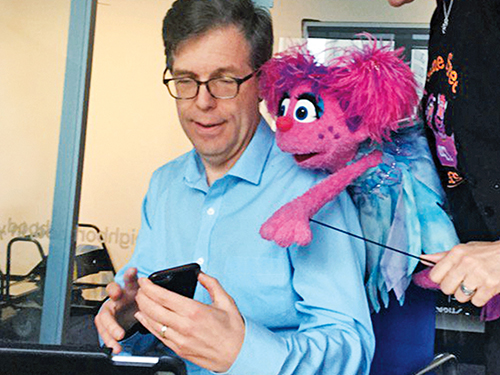
By Bethany Romano, MBA'17
Over the decades, Michael Levine, PhD’85, has rubbed elbows with civil rights activists, politicians, philanthropists, Hollywood celebrities and the most prominent child development researchers of his generation, all in a quest to improve child policy at every possible turn. From his office at Sesame Workshop in Lincoln Square in Manhattan, where he serves as chief knowledge officer, he looks back on a career that spans countries, sectors and disciplines.
“I’ve had a very interesting career,” he acknowledges with a smile. “I’ve been so, so lucky to have great mentors, amazing colleagues and transformational opportunities.”
A Foundation in Social Justice
Levine grew up in New York City in a family deeply rooted in the social justice issues of the day. He says, “My dad worked with civil rights organizers, including leaders in Martin Luther King’s inner circle like Andrew Young, so we always had lots of interesting people coming into the house. Our kitchen-table conversations were very much about the pressing issues of the moment — we constantly had to stop eating dinner because Walter Cronkite was on in the background.”
Levine was inspired by his father’s work, joining the speech and debate club at his public high school in New York and becoming a youth organizer for a presidential campaign at age 14. When it came time for college, “That’s when my mother’s influence really kicked in,” says Levine, whose mother is a nationally known mental health clinician and expert on child development and family dynamics. At Cornell, he got involved in child development research under the tutelage of Urie Bronfenbrenner, founder of the ecological systems theory of child development.
Bronfenbrenner put Levine to work as an undergraduate research assistant on a cross-national study where he focused on the needs of vulnerable U.S. families with young children. “It was very heady and exciting to be an undergraduate involved in all that,” he says. “Everything the team did was applied — so I got very interested in translating field research into public policy.”
Levine’s foray into research prompted new interests in economic development, job training and public policy — all of which led him to the Heller PhD program.
“I made a choice to go to the Heller School because the school had heart and soul,” he says. “At Heller, social justice was in the DNA. The folks who walked the halls of Heller in the mid-1980s were mentors, activists and scholars who had been present at the very beginning of social justice policymaking. My upbringing was steeped in the civil rights movement and the War on Poverty, and Heller was a logical extension of that.”
At Heller, Levine worked on grant-funded projects led by faculty members Andy Hahn, PhD’78, Barry Friedman, Lorraine Klerman and Richard Weatherley, among others. Despite the research responsibilities and course workload, Levine carved out time to stay politically active, interning in the U.S. Senate for Howard Metzenbaum, D-Ohio, and even attending the occasional Brandeis grad-student party — just one, in fact. At that party he met Joni Blinderman, MA’83, a master’s degree student in the Hornstein Jewish Communal Service program. “The only graduate-student party I ever went to, I met my wife at,” he says with a grin. They were married at the Berlin Chapel on the Brandeis campus in the fall of 1983.
Levine’s doctoral studies overlapped with President Reagan’s first term, and the dramatic federal cutbacks that characterized his administration helped to define Levine’s research. In his dissertation, Levine examined the institutional supports and barriers to social policy innovation in an era of restricted resources. He says, “I learned a lot about the role of the media, the role of philanthropy, the role of faith leaders — all of the key sector players. Visiting 14 cities and speaking with all of those pivotal institutions was really influential in my thinking about the ecological system around a kid.”
From New York to the National Level
After graduating, the newlyweds relocated to New York City, where Levine had been recruited to work for Mayor Ed Koch on “a smorgasbord of youth issues,” including homelessness, school dropouts and prevention services. He was regularly called on to represent the mayor’s office in community debates, especially disputes around school safety, access and quality. When kids were getting sick at three schools with coal-burning furnaces, “it was ‘send Michael out, he grew up in Queens,’” he says. He also learned the ins and outs of New York City real estate deals, playing an important role in finding new homes for specialized schools such as the High School of Performing Arts (the “Fame” school) and Stuyvesant High School.
That position marked Levine’s entry into a series of jobs focused on improving New York’s embattled public school system. At the New York Urban Coalition, he focused on improving school leadership and teacher quality by training teachers, superintendents and principals. Then he became special assistant to Richard Green, the first black New York City Schools chancellor. The work for Chancellor Green was intense, the stakes were high and the politics were “a viper’s pit,” says Levine. “I learned a ton, but I was working 75 to 80 hours a week and had a new family.
“Then one day, in May of 1989, at 3 o’clock in the morning, my phone rang. My boss — the chancellor — had died suddenly of a heart attack.”
Though Levine was offered another position in the chancellor’s office, he decided it was time for a change. He says, “I didn’t want to be a member of a big bureaucracy forever. I felt like I’d done deep work at the city level, and perhaps I should try to do something on a national level.”
In 1990, the Carnegie Corporation of New York hired Levine to run its early childhood portfolio. “It was the biggest break of my life,” he says. “At that point, there was no emphasis on the first few years of life in U.S. national policy, so we became the think tank behind new ideas like Early Head Start and SCHIP [State Children’s Health Insurance Program] and home-visiting programs. It was a very active and deeply thoughtful philanthropy.”
At Carnegie, Levine contributed to a landmark report titled “Starting Points: Meeting the Needs of Our Youngest Children,” which sparked a national conversation about those critical early years. The report, which delved into new research on the child’s developing brain, appeared on the front page of The New York Times and quickly reached President Clinton’s desk.
Levine’s phone started to ring — and one of the calls was from filmmaker Rob Reiner. “He had read the report and was of the opinion that early child development was the most important issue in the nation,” says Levine. “He was getting more politically active at this point, so he asked me to come to Hollywood and organize a briefing for him and a few friends.”
On Christmas of 1995, Levine and a few colleagues flew to Los Angeles to deliver a policy briefing in Rob Reiner’s home theater. Among the attendees were Steven Spielberg, Kate Capshaw, Warren Beatty and Annette Bening. “It was crazy,” he says. “We knew it was a big opportunity — if Hollywood gets involved in an issue, it could really help drive the message home.”
Levine was familiar with the entertainment field and its power to persuade. His brother, Dr. Robert Levine, was married to Mary Tyler Moore, and he had learned about finding allies across the aisle from his “more conservative” sibling. “Mary and Robert built bridges on the importance of biomedical research, relying on a bipartisan approach to find a cure for juvenile diabetes — a disease that afflicted Mary. They found a way to work with leaders as different as Newt Gingrich and Tom Harkin,” he says.
That meeting in Reiner’s home theater marked the beginning of the “I Am Your Child” campaign, a national public education initiative on early childhood development. Reiner recruited Levine to run the campaign, and Reiner leveraged the star power of celebrities like Tom Hanks, Colin Powell, Whoopi Goldberg and Jada Pinkett Smith to catapult early childhood brain development into the mainstream.
“We did all sorts of great work together,” Levine says, “including organizing dozens of awareness campaigns, a prime-time special directed by Reiner and narrated by Hanks on the importance of the early years, special editions of Newsweek magazine on the importance of ages 0-3 with babies on the cover and two White House conferences on childhood development.
“And then 9/11 happened.”

An Eye Toward the Future
The shock and tragedy of 9/11, combined with road weariness from his travel-heavy work with Hollywood, inspired Levine to turn his sights to a new issue: the wave of xenophobia that arose after 9/11. He took a position as vice president for the Asia Society, which focuses on promoting the importance of global education across languages, regions and cultures.
Part of his work included running exchange programs for U.S. leaders in education and policy. Through one such trip to India, Levine spent time with Gary Knell, the CEO of Sesame Workshop. Knell had a vision to start something completely new at Sesame — an independent research arm of the organization that would focus on education in an era of rapidly changing technology. It would be named after the co-founder of Sesame Workshop and co-creator of “Sesame Street,” Joan Ganz Cooney, and Knell wanted Levine to lead it.
In 2007, Levine became the founding executive director of the Joan Ganz Cooney Center, along with two staff members and a mandate to think broadly about kids’ use of technology. “When we started, the very first iPhone had just come out. Interactive touch screens weren’t something anyone had much thought about for kids — programming was still very video- and TV-centric. Our purpose at the Cooney Center was to think about what was coming next, to be a scout for Sesame, and to advance the needs of children in the digital age,” he says.
In the 10 years he ran the Cooney Center, Levine helped it become one of the best-known thought leaders around educational technology for children. In particular, the center sought to strike a middle ground in “the debate between technology as menace versus technology as a magic elixir,” as he puts it.
Last year, Levine turned over the reins of the Cooney Center and assumed a new position as Sesame’s chief knowledge officer. “As I reach this stage of my career,” he says, “one of my big interests is to build the field. In my role, I’m doing a good deal of mentoring and support of younger leaders who are in the communications and technologies space. I’ve seen so much change in the course of my career. As government stalls in creativity and innovation, who actually influences policy and practice? I have a new appreciation for the role that socially responsive corporations, startups and nonprofits with hybrid business models can bring to accelerate change for good.”
As he reflects on a career that began in research, shifted to policy, program development and grant making, and included rubbing elbows with entertainment icons (including Big Bird), Levine says, “My purpose now is to support the growth of the next generation of leaders by helping them use evidence-based research and strategic communications tools to drive progress.”
Despite everything he’s experienced in the last decades, Levine feels that he can draw “a direct line” from his studies at Heller to his work at Sesame today. “Being at Heller during the Reagan years reinvigorated my commitment to analyze social problems and policy fixes with a justice and equity lens. My career proceeded with that core awareness as a kind of ‘planned serendipity.’”
Levine’s family planted the seeds for what he refers to as “my own march to Selma,” and Heller inculcated the values of lifelong learning, alliance building and a passion for helping the most vulnerable kids. And these values, he says, “are needed now more than ever.”
